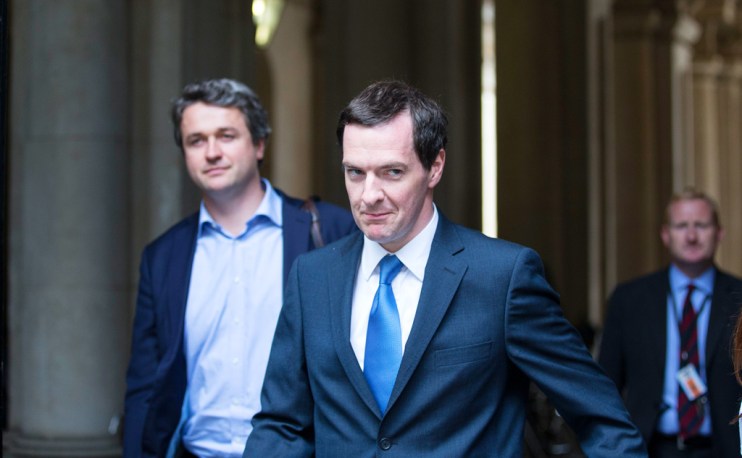George Osborne’s former adviser Rupert Harrison: Extra spending in Budget is ‘welcome’

Rupert Harrison has spent the last few weeks monitoring obscure economic indicators – everything from pollution in Chinese cities to traffic in Milan – in an effort to guide his clients at investment giant Blackrock through the worst market crisis since 2008.
He’s no stranger to financial turbulence, however, having been chained at the hip to then-chancellor George Osborne as he navigated the Eurozone meltdown and the recovery from the financial crisis as the top policy adviser at Number 11. It was a role he held for five years, during which some took to calling him the “real chancellor”.
Harrison is well-placed, then, to talk about the colossal pressure on Britain’s 39-year-old chancellor Rishi Sunak, who will tomorrow give the first Budget since the Conservatives’ landslide election win in December.
Once billed as the Budget that would “level up” spending across the country, it is now set to be an exercise in coronavirus damage limitation. “The economic impact is most like a natural disaster,” says Harrison, who has been a portfolio manager at Blackrock since leaving Downing Street in 2015.

To add to Sunak’s difficulties, he has only been in the job a month. He was promoted to chancellor – his first full cabinet role – in February after his predecessor Sajid Javid clashed with Prime Minister Boris Johnson and his adviser Dominic Cummings.
The real problem Sunak faces in the upcoming Budget, Harrison says, “is how do you reach millions of small businesses struggling with cash flow” as the virus disrupts supply chains and dents demand.
“Trying to get up and running systems to reach those businesses and try and help them survive the period is going to be a challenge,” Harrison says. “I think in practice, you probably have to do that through the banking system.”
So what might that look like? The Bank of England has already said some kind of supply-chain finance is likely. Harrison says governments such as the UK are likely to focus on building “a public insurance system for lost business”, accessible through banks.
Yet much of the effort, he says, will not be on drastic policies but on helping firms manage things like their payrolls, rent, and tax payments. “It becomes quite quickly a sort of nitty gritty administrative delivery question,” he says.
What’s it like putting a Budget together? Harrison says it’s a stressful time, but says the creation of the Office for Budget Responsibility (OBR) in 2010 has brought more order to the process. Yet awaiting the OBR’s forecasts brings its own stresses. “It absolutely dominates the choices that you have available,” he says.
“That’s why this Budget is going to be a little odd because obviously something has happened in the last couple of weeks that is probably going to make those forecasts quite out of date.”
Markets looking for fiscal stimulus
One thing is for certain, Harrison says. Markets are crying out for government spending. In a world of ultra-cheap borrowing, investors are looking for a “permanently looser fiscal stance from governments, conditional on wanting to see that extra spending invested at a high return rate, whether that’s infrastructure growth, enhancing investments, paying for the cost of net-zero [carbon] transition”.
In the UK, he says, “everybody has taken on board the focus on regional growth, infrastructure, and the productivity agenda”. He adds: “That’s welcome, as a UK citizen or as an investor in UK assets.”
It’s a surprising statement from a man who can fairly be described as one of the key architects of austerity. Has he changed his mind? “The circumstances have changed,” he says. “Instead of a budget deficit of 10 per cent we’ve got a budget deficit of one, two per cent [and] we’re in a lower-for-longer interest rate environment.”
Yet, he says, “if you’re going to keep some kind of fiscal discipline, then it seems unlikely that we’re going to get large, uncosted cuts in tax. But that’s fine; I don’t think markets or investors are looking for big cuts in UK tax”.
Harrison says he won’t tell the new chancellor what his new fiscal rules should be. Yet, he says, “markets are willing to tolerate higher spending and higher borrowing if it’s directed towards growth enhancing and high-return investments. That’s the key”.
With coronavirus scaring the public, the government has to get the politics of the Budget just right. Harrison knows what it means for things to go wrong. Eight years ago his boss faced a fierce backlash after the “omnishambles” Budget best remembered for the swiftly-ditched “pasty tax” on hot takeaway food.
“It was quite a dramatic time,” Harrison wryly says. But he says Number 11 always had the long game in mind. “The political world was obsessed with pasty taxes but really the important judgement was sticking to the macroeconomic plan.”
“These budget decisions actually matter over a longer time period. Market participants know that, and will look through a lot of the political noise.”
For Sunak, however, the long game may have to wait until the autumn. As Harrison says, there will only really be “one story in town” on Wednesday: can the government get ahead of the virus?